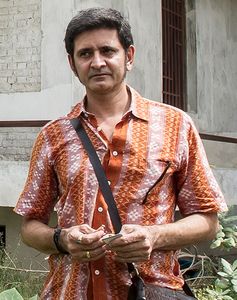I start with a sad story. It has been a month since the Kochi-Muziris Biennale, South Asia’s biggest contemporary art festival, began successfully. However, a lump in the throat still remains. Soon after the biennale had started, I was told that one of my dearest friends had passed away in his sleep. Tushar Joag was always an artist interested more in being an educator than in his practice. He was always socially conscious and politically critical.
Talking about Tushar is very difficult because our bond goes back a long way to our days in the Sir JJ School of Arts, Mumbai. He was couple of years senior to me in college and was pleasant and handsome. His time at an artist-residency in Amsterdam changed his perception of contemporary art. Tushar co-founded Open Circle, an artist collective that sought to engage with contemporary socio-political issues via an integration of theory and practice. Tushar was a good soul and I will always miss him. He was supportive ever since Riyas and I made the proposal for a biennale in Kochi. In fact, after he joined Shiv Nadar University as a professor of arts, he brought students from the university to the last biennale.
Amid the despair about a dear departed friend, something else cheered me up. This happened in the middle of the opening of the fourth edition of the Kochi-Muziris Biennale. This was the invitation to be a member of the International Biennale Association (IBA). Top biennale functionaries from across the world came to Kochi for three days of official deliberations. The IBA, based in Sharjah, the United Arab Emirates, and founded in 2012, also held its fifth general assembly in Kochi. The board meetings on the first two days and the general assembly were closed-door. The final day’s conference was open to the public.
The public conference, titled ‘Shifting Borders: Biennials in Transforming Landscapes’, was held at the Biennale Pavilion in Cabral Yard, Fort Kochi. The Kochi Biennale Foundation co-hosted the four-hour meet. The keynote address was delivered by Yuko Hasegawa, chief curator of the Museum of Contemporary Art, Tokyo, who shared her experiences and work at numerous biennials. It was followed by panel discussions to further explore the role of biennials and their ability to connect art with communities.
IBA president Hoor al Qasimi, who also heads the Sharjah Art Foundation, spoke on the occasion. Select IBA members from around the world gave presentations about their biennials and institutions with a view to increase representation while offering opportunities for collaboration. Aichi Triennale, Ballarat International Foto Biennale, Biennale of Sydney, Land Art Mongolia, Manifesta, Media Arts Biennial Chile, Rencontres de Bamako and the Atlantic Project gave interesting thoughts. I was overwhelmed and, also, informed for the better. It was great to have them all here. That is what Kochi is all about. We aspire to be good hosts and the biennale is a way to educate, entertain and emancipate.
There are new initiatives with this biennale, like every time. This year the Students’ Biennale expanded and included students from the SAARC countries. It was a great experience to see them work here. It reaffirmed the fact that art, and only art, can bring people together. We are one and nothing can separate us. The evidence lies in the fact none of the hartal calls had any effect on the footfalls at the biennale. This biennale, so far, has been as the famous Ornette Coleman songs go: ‘Open to The Public’; ‘Check Out Time’. Just as Tushar reminded us.
editor@theweek.in


